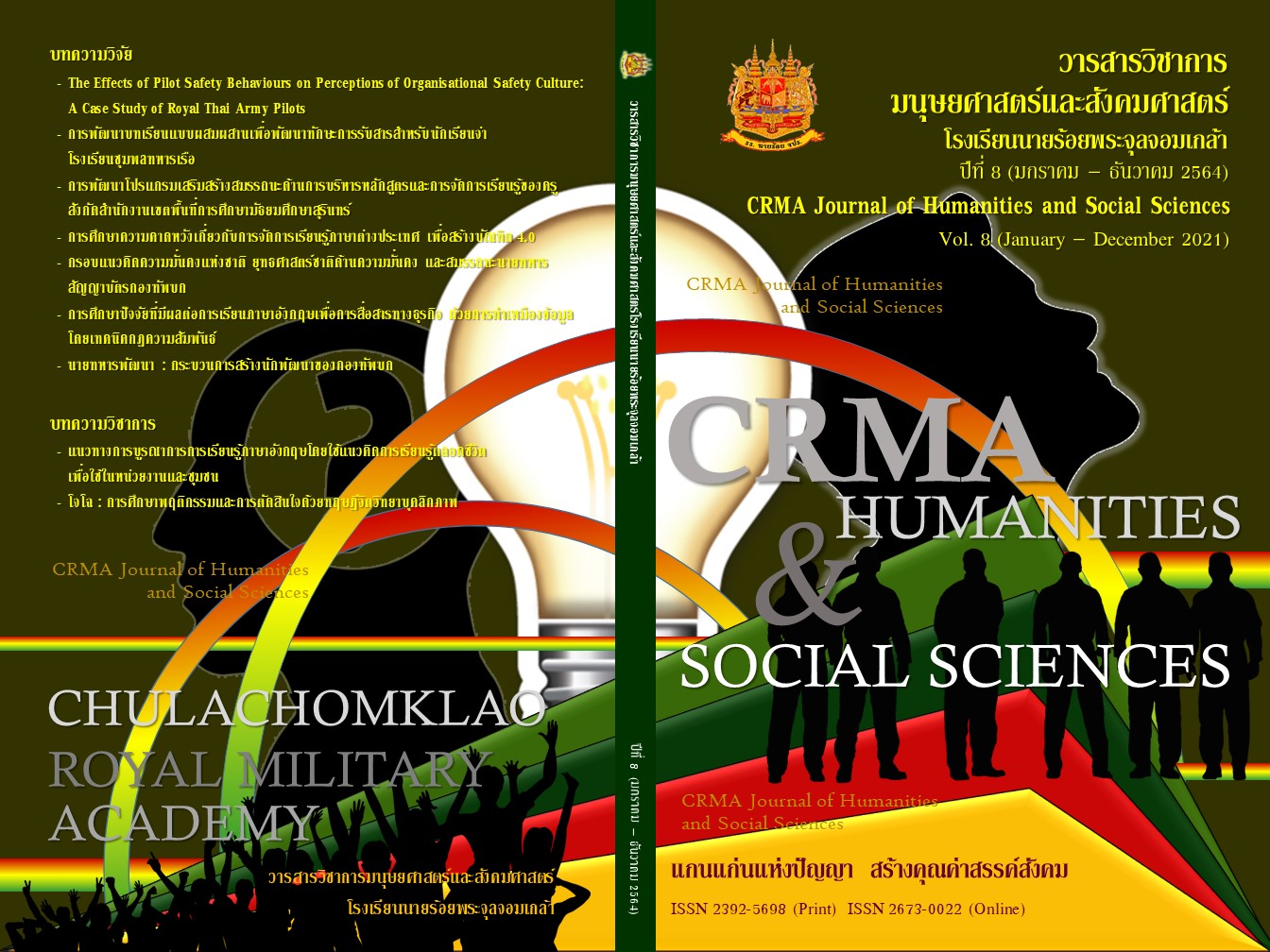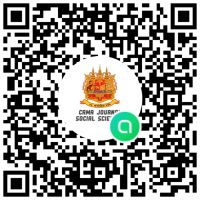A STUDY OF FACTORS AFFECTING ENGLISH LEARNING FOR BUSINESS COMMUNICATION IN DATA MINING BY ASSOCIATION RULE TECHNIQUE
Keywords:
A Study of Factors Affecting Learning, English for Business Communication, Data Mining, Association Rule TechniqueAbstract
The objectives of this research were: 1) to compare the difference among students’ grade average, attitude, and learning behavior as well as to study the relationship among students’ motivations, attitudes, and behaviors towards the English for Business Communication; 2) to study the relationship by Descriptive Modeling of students’ who studying the English for Business Communication course were motivation, attitude, and behavior base on the Association Rule. The samples of 180 undergraduate students studying at the Faculty of Humanities and Social Sciences, Rajamangala University of Technology Tawan-ok. The research instrument was a questionnaire. The Statistics used for data analysis were descriptive statistics and inferential statistics One-way ANOVA, Pair-wise comparison testing by Fisher’s Least Significant Difference (LSD), Pearson's Correlation Coefficient, and Data Mining by Association Rule technique. The results of the research were as follows: 1) The students’ learning motivation and attitudes in overall were at a high level, and the behavior was practicing in sometimes. In comparing the difference between grade average and learning attitude, the results showed that the students with difference grade average had different learning attitude statistically significance at the .05 level. In comparing the difference between grade average and learning behavior, it was found that the grade average was different, but the students’ behavior was not different. Moreover, by Pearson's Correlation analysis, it was found that the motivation was positively correlated to the attitude and the behavior at a moderate level statistically significance at the .01 level. 2) The motivation data model affected to grade average improvement and information searching need. The attitude affected to have foreign friends and develop themselves for getting scholarships to studying abroad. The behavior affected to find out friends who pay attention to learn, class attendance, and hand in their homework regularly.
References
กฤชเชาว์ นันทสุดแสวง. (2563). ทัศนคติของนักศึกษาที่มีต่อการเรียนการสอนภาษาอังกฤษในระดับต่ำ. วารสารมหาจุฬาวิชาการ, 7(1), 189-203.
ชัยวัฒน์ บวรวัฒนเศรษฐ์. (2563). การศึกษาสภาพการเรียนรู้นอกชั้นเรียน ปัจจัยที่มีอิทธิพล และความสามารถในการฟังภาษาอังกฤษเพื่อความเข้าใจของนักเรียนนายเรือชั้นปีที่ 4. วารสารวิชาการมนุษยศาสตร์และสังคมศาสตร์โรงเรียนนายร้อยพระจุลจอมเกล้า, 7, 37-50.
จารุพร ตั้งพัฒนกิจ. (2563). อิทธิพลของปัจจัยที่ส่งผลต่อการพูดสื่อสารภาษาอังกฤษโดยมีแรงจูงใจเป็นตัวแปรคั่นกลางและความวิตกกังวลเป็นตัวแปรกำกับ. วารสารบริหารธุรกิจและศิลปศาสตร์ ราชมงคลล้านนา, 8(2), 111-126.
ฉัตรชนก เฮงสุโข กรรณิการ์ บุญขาว นิรันดร สีหะนาม และวิสิทธิ์ มะณี. (2562). สถานการณ์ปัจจุบันและปัจจัยที่ส่งผลกระทบต่อการใช้ภาษาอังกฤษเพื่อการสื่อสารของคนไทย. วารสารศึกษาศาสตร์ มมร., 7(1), 155-160.
นิภาพรรณ เจนสันติกุล. (2563). เกรด: สัญลักษณ์และการให้ความหมายในมุมมองผู้สอนและผู้เรียน. วารสารวิจัยวิชาการ, 3(3), 175-186.
พรพิมล ชัยวุฒิศักดิ์ และยุวดี กล่อมวิเศษ. (2562). การพัฒนากฎการทำนายผลการเรียนของนักศึกษาชั้นปีที่ 1 โดยใช้เทคนิคการทำเหมืองข้อมูล. วารสารวิจัยวิทยาศาสตร์และเทคโนโลยีรามคำแหง, 22(2), 43-54.
วราภรณ์ ไวคกุล โรจนรินทร์ โกมลหิรัญ และภัทราภรณ์ สอนคำมี. (2557). ศึกษาความผิดพลาดของการใช้สถิติสำหรับการวิจัยทางวิสัญญีวิทยา. วิสัญญีสาร, 40(1), 64-77.
ศราวุธ แดงมาก. (2560). โลกแห่งดิจิทัล ยุคแห่งข้อมูลข่าวสารความมหาศาลของข้อมูลทางการแพทย์ สู่การค้นพบความรู้ที่มีค่าด้วยการทำเหมืองข้อมูล. เวชบันทึกศิริราช, 10(1), 29-33.
ศิริชัย กาญจนวาสี ดิเรก ศรีสุโข และทวีวัฒน์ ปิตยานนท์. (2558). การเลือกใช้สถิติที่เหมาะสมสำหรับการวิจัยทางสังคมศาสตร์. วารสารวิธีวิทยาการวิจัย, 6(1), 15-35.
ศุภิกา นิรัติศัย. (2561). ทัศนคติ แรงจูงใจ และพฤติกรรมการเรียนภาษาอังกฤษของนักศึกษามหาวิทยาลัยราชภัฏภูเก็ต. วารสารมนุษยศาสตร์และสังคมศาสตร์ มหาวิทยาลัยอุบลราชธานี, 9(2), 138-170.
สุวิมล สิทธิชาติ. (2560). การวิเคราะห์คุณลักษณะพื้นฐานทางการศึกษาด้วยเทคนิคเหมืองข้อมูล. วารสารเทคโนโลยีสารสนเทศ, 13(2), 20-28.
สำนักส่งเสริมวิชาการและงานทะเบียน มหาวิทยาลัยเทคโนโลยีราชมงคลตะวันออก. (2548). รายวิชาภาษาอังกฤษเพื่อการสื่อสารทางธุรกิจ ปีการศึกษา 2562-2563. สืบค้นจาก http://regis.rmutto.ac.th/registrar/home.asp
อัญชนา กลิ่นเทียน และจรัญ แสนราช. (2557). ปัจจัยที่มีผลต่อแรงจูงใจใฝ่สัมฤทธิ์ทางการเรียนของนักศึกษาระดับปริญญาตรีที่เรียนสาขาการผลิตสื่อดิจิตอลแอนนิเมชั่นมัลติมีเดียและเกมส์. วารสารวิชาการนวัตกรรมสื่อสารสังคม, 2(1), 25-41.
Al-Tamimi, A., & Shuib, M. (2009). Motivation and Attitudes Towards Learning English: A Study of Petroleum Engineering Undergraduates at Hadhramout University of Sciences and Technology. GEMA Online Journal of Language Studies, 9(2). 29-55.
Anirut, j. (2562). 10 ภาษาต่างประเทศที่ดีที่สุดสำหรับการทำธุรกิจที่ SME ไม่ควรมองข้าม. HIGHLIGHT, THE ACADEMY. สืบค้นจาก https://www.smartsme.co.th/content/111044
Bachtiar, F. A., Sulistyo, G. H., Cooper, E. W., & Kamei, K. (2014). Modeling student affect in English learning achievement using association rules. In The Asian Conference on Society, Education and Technology, October 28 - November 2 Osaka: Japan.
Chang, C. H., & Liu, H. J. (2013). Language Learning Strategy Use and Language Learning Motivation of Taiwanese EFL University Students. Electronic Journal of Foreign Language Teaching, 10(2), 196-209.
Gardner, R.C. & Lambert, W. E. (1972). Attitude and Motivation in Second Language Learning. Newbury Rowley, 786, 43-54.
Gardner, R. C. (1985). Social psychology and second language learning: The role of attitudes and motivation. London: Edward Arnold.
Manjarres, A. V., Sandoval, L. G. M., & Suárez, M. S. (2018). Data mining techniques applied in educational environments: Literature review. Digital Education Review, 33, 235-266.
Weinstein, C. E., Palmer, D., & Schulte, A. C. (1987). Learning and Study Strategies Inventory (LASSI). North Carolina State University.
Downloads
Published
How to Cite
Issue
Section
License
The content and information in this journal shall be considered as the individual opinions of the authors. In all cases, the editorial board may not necessarily agree with these opinions or be responsible for them.
The articles and information that are published in the journal are considered to be the copyright of the journal. Any party who wishes to re-publish the journal’s articles must seek permission from the journal’s editor. Articles that receive the agreement for publications must not appear in any other publications prior to their appearance in this journal. The editorial board will send one copy of the journal to each author whose submission was accepted and published.







